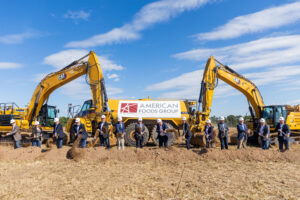Editor’s Note: Matt Plummer is principal at The Yield Lab, one of agtech’s oldest accelerator programs for startups. While the value of accelerators for startups is quite clear, how venture capital firms view these resources is less so. Here, Plummer explores the value accelerators offer to venture capital firms.
The growing number of resources available to agtech startups has created some confusion. In a report in August, AgFunder, AgThentic and AgInnovation Development Group detailed 77 resources available for entrepreneurs in the food and agtech space. This soon grew to 90 and keeps climbing.
These resources range from accelerator programs to incubators to pitch competitions and more, with some market participants expressing confusion over what each one does. While the report lays out definitions for each type of resource, the interaction of the venture capital firms — which ultimately pick up the mantle of supporting startups through the next stages — and the value they take from these programs is still not clear.
Working at The Yield Lab accelerator, which is in its third cohort and about to launch a new program in Ireland, I was particularly keen to take a closer look at how venture capital firms perceive this type of resource.
According to the report, an accelerator is “a set duration program where a cohort of selected early-stage companies gets access to a business development curriculum and mentor network. Accelerators often result in funding for participating startups on a set or negotiated basis.”
Many accelerators measure their success on the ability to attract venture capital for the startups in its cohort at the end of the program. This makes the support of VCs very important. In turn, VCs need to find value in engaging with these programs. While this requires understanding the nuanced differences between what various accelerators do and don’t provide, overall, after speaking to a few VCs in the agtech space about this, we believe accelerators provide them value in three ways.
-
Deal flow
Deal flow to a VC is as important as cash flow is to a business. Having a robust pipeline of companies ripe for investment is imperative. But every VC has finite bandwidth to evaluate opportunities, especially for early stage companies. Many promising companies cannot make it past the first step in a VC diligence phase, so accelerators are uniquely positioned to provide some filtered early stage deal flow, surfacing quality companies that might never have been evaluated otherwise.
“Accelerators are an essential ingredient in a thriving entrepreneurial ecosystem in AgTech,” Kevin Zussman, associate with Cultivian Sandbox told me recently. “It is important that early stage companies have access to critical resources accelerators provide, leading them to an important inflection point in their development as they prepare for the next stage of growth.”
2. Technical/Financial de-risking
When larger VCs look for investment opportunities, whether they span the agriculture/food spectrum or have a sector focus, their due diligence process aims to understand the various risks of investing in a certain company, including the technical, financial and market risks involved. But due diligence can only overturn so many stones. VC participation in an accelerator program can provide insights into how a company tackles these risks, its ability to hit key milestones, and overall, it’s a chance to see a company’s progression. Some VCs also like to see the accelerators invest equity in their cohort.
“Accelerator programs that take an equity position de-risk the investment for follow on capital by filling skill gaps in management and establishing key business development partnerships,” said Allison Carmen, Cultivation Capital Technology Fund II principal. 3.
3. Management team de-risking
VCs also tell us that accelerators are a valuable way to bring startup management teams up to speed, and ready for VC funding. Many founders may have hit on a clear market opportunity, are developing a technology with game changing potential, or are just phenomenal operators, but lack experience fundraising at the early stages. This means they don’t know what investors look for, how to structure a raise, run a process, or how to find, vet and pitch investors, Mike Betts, director of investments at AgFunder told me.
“Others just need a little more time and support to get to the next milestone or two that will make them attractive to VC investors,” he said. “Some of these things we can provide at AgFunder (network, connections, industry insight, the pitch), as can other VCs, but all of these are things the right accelerator can provide a startup.”
At The Yield Lab, we pride ourselves on our connections to customers, collaborators, and venture capital firms active in the sector, but want to know that we are always adding value for them to ensure the development and maturation of the agtech sector overall. Are there any other ways we can make your lives easier and the agtech market more compelling? We want to hear from you! Email [email protected].





